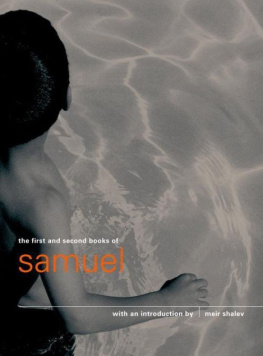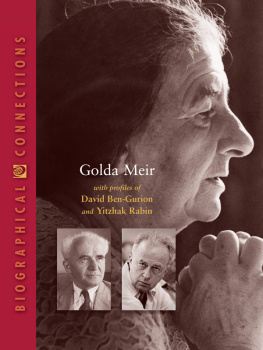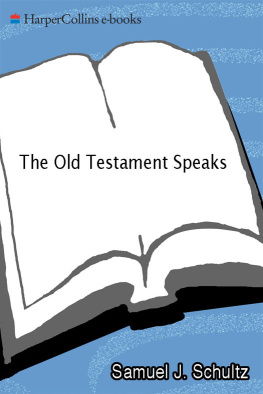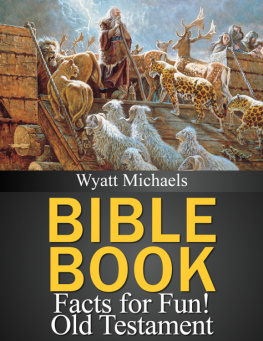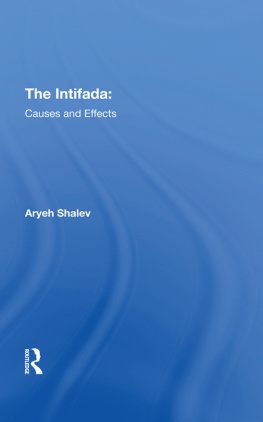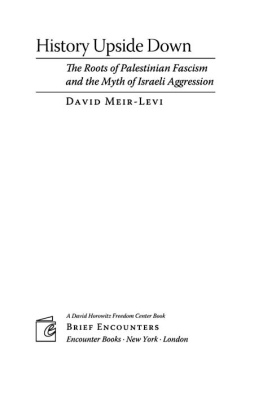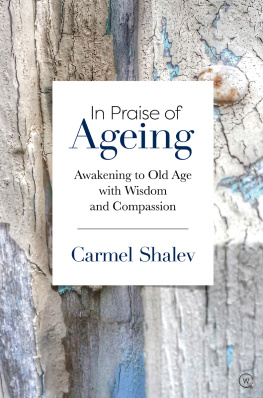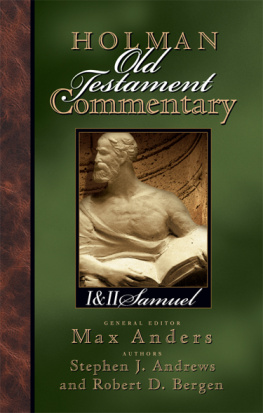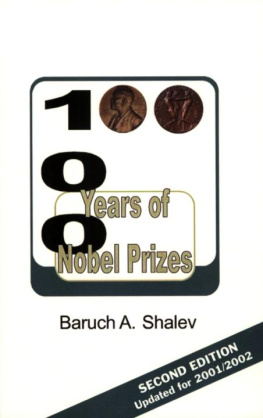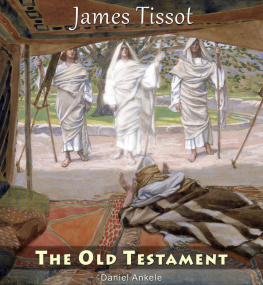Meir Shalev - The First and Second Books of Samuel
Here you can read online Meir Shalev - The First and Second Books of Samuel full text of the book (entire story) in english for free. Download pdf and epub, get meaning, cover and reviews about this ebook. year: 1999, publisher: Canongate Books, genre: Romance novel. Description of the work, (preface) as well as reviews are available. Best literature library LitArk.com created for fans of good reading and offers a wide selection of genres:
Romance novel
Science fiction
Adventure
Detective
Science
History
Home and family
Prose
Art
Politics
Computer
Non-fiction
Religion
Business
Children
Humor
Choose a favorite category and find really read worthwhile books. Enjoy immersion in the world of imagination, feel the emotions of the characters or learn something new for yourself, make an fascinating discovery.
- Book:The First and Second Books of Samuel
- Author:
- Publisher:Canongate Books
- Genre:
- Year:1999
- Rating:5 / 5
- Favourites:Add to favourites
- Your mark:
- 100
- 1
- 2
- 3
- 4
- 5
The First and Second Books of Samuel: summary, description and annotation
We offer to read an annotation, description, summary or preface (depends on what the author of the book "The First and Second Books of Samuel" wrote himself). If you haven't found the necessary information about the book — write in the comments, we will try to find it.
This volume presents the Old Testament book of Samuel, with an introduction by Meir Shalev. In two parts, the book tells the story of one of the most charismatic of Old Testament characters, King David and his meteoric rise and inevitable fall.
The First and Second Books of Samuel — read online for free the complete book (whole text) full work
Below is the text of the book, divided by pages. System saving the place of the last page read, allows you to conveniently read the book "The First and Second Books of Samuel" online for free, without having to search again every time where you left off. Put a bookmark, and you can go to the page where you finished reading at any time.
Font size:
Interval:
Bookmark:
The Authorised King James Version of the Bible, translated between 160311, coincided with an extraordinary flowering of English literature. This version, more than any other, and possibly more than any other work in history, has had an influence in shaping the language we speak and write today.
Twenty-four of the eighty original books of the King James Bible are brought to you in this series. They encompass categories as diverse as history, philosophy, law, poetry and fiction. Each Pocket Canon also has its own introduction, specially commissioned from an impressive range of writers, to provide a personal interpretation of the text and explore its contemporary relevance.
Meir Shalev, one of Israels most celebrated young novelists, is theauthor of Four Meals, Esau and Roman Russi, all of which havebeen literary and commercial successes. His latest novel, Alone in the Desert, has enjoyed best-seller status in Israel and in Holland.His books have been translated into thirteen languages. Shalev hasalso written a collection of biblical commentaries, The Bible for Now, and a book of literary criticism, Mainly about Love. Healso writes childrens books, and is a columnist with the Israelidaily newspaper, Yediot Ahronot. He lives in Jerusalem with hiswife and children.
Ruddy, and Withal of a Beautiful Countenance
Of the three main characters in the Book of Samuel, only two died. King Saul, a tragic, haunted figure, fell on his sword at Mount Gilboa. Samuel the prophet, a benighted religious zealot, is brought back from the dead once, then sinks into oblivion forever. Aside from the two books at hand, the books that bear his name, he left nothing worth pining for. But David, king of Israel as we children of Israel are fond of singing Lives and breathes.
Three thousand years after the death of David we still wait for him to reappear, we read the psalms attributed to him, we even let him participate in political discussions on the future of the Middle East. But like another ruddy, charming, shrewd war hero Odysseus David, too, has a deep, personal side, emotional and spiritual. Today, three thousand years later, it is far more interesting than his politics or liturgy.
Like many other Israelis, I met King David. I was nine at the time, and my father took me to the valley of Elah, between Shochoh and Azekah. Ceremoniously planting himself in the middle of the valley, he announced that here David had killed Goliath. He read me I Samuel 17 and instructed me to pick up five pebbles; when I touched the smooth, rounded stones, I a short, bespectacled boy felt as though I were clasping Excalibur and fighting off all the evil Goliaths of the world.
The victory over Goliath is not Davids first appearance on the Biblical stage. It was preceded by the prophet Samuels visit to Bethlehem, where David was anointed king. In the finest tradition of fireside stories, Samuel saw before him a young man who was ruddy, and withal of a beautiful countenance, and goodly to look to (1:16:12) and underestimated him. Samuel saw with his eyes, but the Lord, who saw into the heart, said: Arise, anoint him: for this is he (1:16:12).
We next meet David when he comes to play for Saul. Here he is described with more impressive, magnanimous adjectives: [he] is cunning in playing, and a mighty valiant man, and a man of war, and prudent in matters, and a comely person, and the Lord is with him (1:16:18). Without reservation, this is a description of the perfect man: he is wise, handsome, brave, an artist favoured by God. No wonder his star rises, no wonder he ascends higher and higher, and no one friend or foe can resist his charm, his might, or his wisdom.
All five of these characteristics courage, wisdom, artistic ability, beauty, and good luck will be manifested at one stage or another of Davids life; this is obvious. But often the Bible requires a closer reading, even a creative understanding of the text.
Although not apparent on first reading, I am referring to one of Davids most basic characteristics, which may result from the combination of the five traits listed above. That is, his ability to kindle love in the heart of another. On the wings of this love David ascended to lofty heights.
And Jonathan Loved Him as His Own Soul
The reader of the chronicle of David will discover that the word love is used extensively in the Book of Samuel: And David came to Saul, and stood before him: and he loved him greatly; the soul of Jonathan was knit with the soul of David, and Jonathan loved him as his own soul; And Michal Sauls daughter loved David; for Hiram was ever a lover of David; But all Israel and Judah loved David
Not one Biblical figure was the object of as much love as David. But closer inspection reveals an additional phenomenon: every time the verb love is connected to Davids name, the love is directed at him, but does not emanate from him to another. Saul, Michal, Jonathan, Hiram king of Tyre, the people of Judah and Israel all of them loved David, but who did David love? At the linguistic level, David did not love even one person the verb love is never used to describe his relation to anyone.
To return to the lovers of David, King Saul loved him and wanted his life at one and the same time. His children, Jonathan and Michal, loved David fully and entirely, without reservation or score-keeping. In particular, this is ascribed to Jonathan. I do not see the relations between them as homosexual but they do seem to be soulmates. One way or the other, Jonathan, like his sister Michal, loved David as his own soul and, like her, betrayed the interests of both Sauls lineage and himself because of that love.
In his famous lamentation over the death of Saul and Jonathan, David says: I am distressed for thee, my brother Jonathan: very pleasant hast thou been unto me: thy love to me was wonderful, passing the love of women (2:1:26). It is interesting that he says thy love to me rather than my love to thee or our love.
Davids lamentation over Saul and Jonathan is a political and literary masterpiece. It expresses not only his grief, but also his perception of leadership. In effect, it is so polished and calculating that the reader is liable to think that David is either hiding his emotions or perhaps has none. But was David lacking in emotion? Absolutely not.
His terrible pain over the death of his son Absalom, with his horrifying, unpolished wail that rends the heart of the reader even today: would God I had died for thee, O Absalom, my son, my son! (2:18:33) these words testify to immense depths of soul and emotion. But strangely enough, the word love is absent even from Davids relation to Absalom, and to his children in general. This is odd, because the text provides a picture of a devoted father, concerned and coddling, sometimes in excess, as with Amnon, Absalom and Adonijah, his unsavoury and debased sons, whom he refused to scold. The verb love is absent from his relation to them, whereas it is prevalent in the descriptions of other Biblical fathers relations with their children.
WentAlong Weeping
In the description of Davids relationship to women, the writer refrains from using the specific word love, and here, too, this is in contrast to other relationships between men and women in the Bible: Isaac loved Rebekah, Jacob toiled for Rachel for seven years, and they seemed unto him but a few days, for the love he had to her (Gen. 29:20). Of Samson it is said: he loved a woman in the valley of Sorek, and her name was Delilah (Jud. 16:4). Amnon said of himself: I love Tamar, my brother Absaloms sister (Sam. 2:13:4). Elkanah preferred Hannah to Peninnah, for he loved Hannah (
Font size:
Interval:
Bookmark:
Similar books «The First and Second Books of Samuel»
Look at similar books to The First and Second Books of Samuel. We have selected literature similar in name and meaning in the hope of providing readers with more options to find new, interesting, not yet read works.
Discussion, reviews of the book The First and Second Books of Samuel and just readers' own opinions. Leave your comments, write what you think about the work, its meaning or the main characters. Specify what exactly you liked and what you didn't like, and why you think so.

